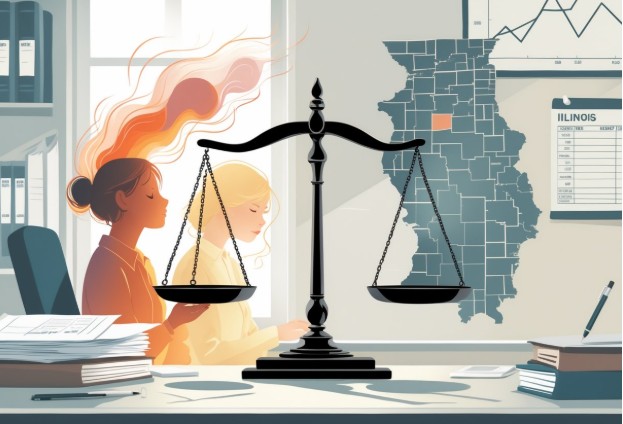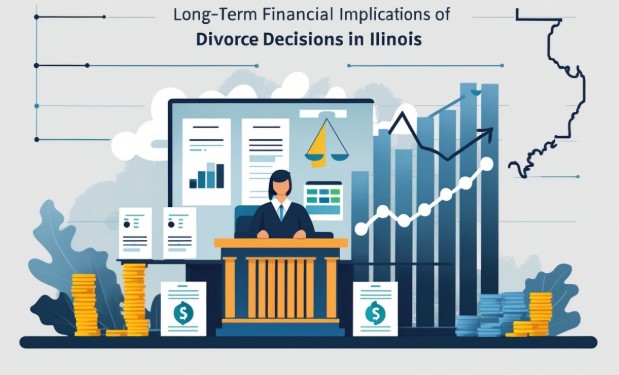Divorce decisions in Illinois can shape your finances for decades. It’s easy to get caught up in immediate issues and overlook the future impact of dividing assets or retirement accounts.
Understanding the long-term financial consequences gives people a chance to make choices that protect their well-being years after the divorce wraps up.
The process can feel overwhelming, especially when emotions run high. Balancing feelings with clear financial planning can help you dodge costly mistakes down the road.
If you work with professionals who know Illinois law, you’ll have a better shot at a fair settlement that supports your long-term stability.
Dividing property isn’t always simple or even close to equal. Non-monetary contributions and future financial needs should definitely influence your decisions.
Thoughtful planning now can save you from unexpected struggles and give you peace of mind years from now.
Key Takeaways
- Quick decisions without complete information can lead to bigger costs later.
- Fair settlements consider more than just splitting assets evenly.
- Planning helps protect long-term financial security.
Why Rushing To Settle Can Cost More Later

Divorce decisions can feel urgent, but moving too fast usually brings hidden costs. Overlooking important financial details, such as taxes or debt division, can create headaches later.
Short-term relief from a quick settlement might feel good, but it often leads to long-term struggles.
Why People Feel Pressured To “Get It Over With”
Divorce is emotionally exhausting. Most folks just want the stress to end.
Family, friends, and the push to move on can pile on the pressure. Court schedules and legal fees don’t help either.
People worry that drawn-out proceedings will drain their money and energy. Sometimes, they’ll accept the first offer just to stop the back-and-forth.
This pressure can really cloud judgment. Important financial choices deserve time and careful thought.
Risks Of Rushing: Tax Surprises, Unbalanced Debt Division
A quick settlement might skip over key tax consequences. For example:
- Transferring assets could trigger unexpected capital gains taxes.
- Misunderstanding tax deductions, spousal support, can lead to surprises.
Debt division can get messy, too. One person may end up with more responsibility, not realizing how it’ll hit their credit or monthly budget.
These hidden risks can cause serious financial harm years after the divorce. Bringing in financial and tax professionals early can help dodge these traps.
The Long-Term Price Of Short-Term Relief
That instant relief can come at a steep price. Improper asset division, missed retirement benefits, or poorly planned child support can pop up later.
Some people find their financial stability crumbles once monthly bills and taxes kick in. It’s a harsh wake-up call.
If you take the time to analyze every part of the settlement, you’ll protect yourself from these long-term issues. Being thorough now can make all the difference for your financial future.
For more on the risks of rushing, check out this article on why you shouldn’t rush into a quick divorce agreement.
Balancing Emotions With Practical Decisions

Divorce stirs up strong feelings that can cloud your judgment. Decisions about property, kids, and money often blend emotion with practical needs.
Recognizing common emotional traps—and leaning on expert advice—can help protect your financial stability.
Common Emotional Pitfalls (Home, Custody, Guilt-Driven Choices)
Deciding who keeps the family home often triggers deep attachment and a sense of loss. It’s tough to stay rational when your house feels like a part of you.
Custody debates can get heated, with parents driven by fear or guilt instead of what’s best legally or financially. Guilt-driven choices happen all the time—like agreeing to unfair financial terms just to avoid conflict or hurting someone.
These moves can lead to long-term regret and financial strain. It’s crucial to recognize these feelings and keep them separate from the money decisions.
Practical Lens: Involving Financial And Tax Professionals
Bringing in financial experts early can prevent costly mistakes. Certified Divorce Financial Analysts (CDFAs) or CPAs who know Illinois law will spot tax impacts and future debts you might miss.
They help ensure fair asset division and clarify post-divorce budgets. Sometimes, they’ll lay out tables or charts showing how each financial decision plays out long-term. For example:
| Decision Factor | Potential Impact | Expert Role |
| Property division | Tax consequences, housing costs | Tax advice, asset valuation |
| Child support and custody | Financial responsibilities | Budget planning, projections |
| Retirement accounts | Penalties, division rules | Legal tax strategy guidance |
This kind of support keeps decisions grounded in facts rather than just feelings.
Acknowledge Uncertainty: It’s Okay Not To Have All The Answers
Divorce brings many unknowns—changing income, legal outcomes, and future expenses. Accepting that you can’t predict every detail takes some pressure off.
Staying flexible and revisiting your financial plans over time lets you adjust as life shifts. Sometimes, you just need to do the best you can with what you know right now.
Building an emergency fund and a realistic budget helps with resilience. This mindset supports both emotional healing and practical financial success long after the divorce is over.
Anna Krolikowska supports Illinois families at every stage—whether you’re exploring divorce, considering mediation, or ready to file. Reach out today for clarity and peace of mind. Contact us.
The Importance Of Full Financial Transparency
Dividing finances in a divorce means both sides need to be honest about all assets and debts. If you know exactly what each person owns, you’ll avoid nasty surprises and get a fair split.
Transparency protects everyone’s long-term financial security by ensuring nothing is hidden or overlooked.
Common Hidden Assets (Accounts, Investments, Property)
Some assets don’t show up easily when you’re sharing financial info. These might include:
- Hidden bank accounts under different names or at smaller banks
- Investments like stocks, bonds, cryptocurrencies, or retirement funds
- Property such as vacation homes, rentals, or land not listed in the main documents
Other things like collectibles, art, or business interests can be tucked away. If these aren’t disclosed, the whole division gets skewed. Knowing the full picture keeps things fair for both sides.
How Hidden Assets Are Discovered (Forensic Accountants, Court Orders)
If something seems off, forensic accountants often get involved. They dig through financial records, tax returns, and property filings to find hidden stuff.
Courts can order complete financial disclosure or let lawyers subpoena bank statements. These legal moves make hiding assets risky and expensive.
Experts and court powers push for honesty and pull hidden details into the open. That helps protect both parties from unfair losses or surprise debts.
Why Full Disclosure Matters For Long-Term Security
Sharing everything builds trust and stops future conflicts. If someone hides assets or debts, lawsuits or financial hardship can follow.
Full disclosure lets you divide things fairly and plan for needs like taxes, retirement, or child support. With accurate info, both people can plan their new financial lives.
Being transparent now reduces uncertainty and sets the stage for stability after divorce. It really helps both sides avoid painful surprises and keeps your interests safe in the years ahead.
Want to dig deeper? Check out Divorce Financial Choices: Navigating Long-Term Implications.
Why Alimony Isn’t The Only Financial Focus
Divorce shakes up every part of your financial life. Alimony often gets the spotlight, but retirement accounts and tax rules can shape your future even more.
Sometimes, these details matter more for long-term stability than support payments ever could.
The Danger Of Over-Focusing On Support Payments
If you focus only on alimony, you might miss bigger problems. Alimony is usually temporary and can change over time.
Relying too much on it means you might ignore building your own savings and income. Alimony amounts can change with legal tweaks or life events, so planning for independence matters.
Ignoring other assets or debts can lead to ugly surprises later. It’s smart to look at the whole financial picture, not just monthly checks.
The Long-Term Role Of Retirement Funds, Pensions, And IRAs
Retirement accounts like 401(k)s, pensions, and IRAs often hold a lot of value. Dividing them the right way can make or break your financial security later in life.
You can’t just take out these funds early without penalties, so timing really matters. If you split retirement assets properly, both sides can keep a steady income down the road.
Some retirement assets need special legal steps to be divided in Illinois. Miss those, and you could end up with costly mistakes.
Tax Implications Of Asset Division
Dividing property and debts brings tax consequences that can sneak up on you. For instance, selling shared property may trigger capital gains taxes.
Alimony payments aren’t tax-deductible for payers or taxable income for recipients anymore, thanks to tax law changes. That shift affects budgeting and planning for both sides.
It’s worth understanding how taxes hit different assets so you can avoid surprise bills. That knowledge helps you negotiate a fair settlement that matches the real financial impact.
| Asset Type | Potential Tax Concern | Important Note |
| Retirement Accounts | Early withdrawal penalties | Must follow legal division rules |
| Property Assets | Capital gains taxes on sale | Timing and market value matter |
| Alimony Payments | No longer deductible or taxable | Impacts net income |
Paying attention to these tax details can really support smarter, long-term financial decisions after divorce.
Thinking 10–20 Years Ahead
Divorce decisions can reshape your finances long after the papers are signed. Credit standing, retirement and education savings, and the need for future planning all come into play.
How Credit Scores And Loans Are Affected
Divorce usually means splitting debts as well as assets. If one person is left with joint loans, missed payments can drag down both credit scores.
Even if the loan gets transferred to one name, the other person’s credit might stay tied to it until it’s refinanced. Lower credit scores make it tougher to get new loans, credit cards, or decent interest rates.
That can make buying a home or car a real challenge for years. Updating loan agreements and removing names helps avoid future credit messes.
It’s smart to check your credit reports regularly after a divorce to catch errors or unpaid debts early.
Impact On Retirement And College Savings
Splitting retirement funds like 401(k)s and IRAs can shrink savings for both people in the long run. If you withdraw before retirement age, you’ll face penalties and taxes, which means less money in the end.
College savings for kids might take a hit if financial support changes. A child’s education fund could lose money or access if priorities shift after divorce.
Taking a close look at both retirement and education accounts shows what needs protection. That way, you can avoid nasty surprises decades later—especially as lifespans and costs keep climbing.
Why Forward Planning Matters Even If You’re Unsure Now
Life after divorce can feel unpredictable, which makes planning tough. Still, sketching out what the next 10 or 20 years might look like can help you spot financial risks you’d otherwise miss.
Sometimes, it helps to map out a few possible settlement scenarios. That way, you can actually see how things like maintenance payments or asset splits might play out.
When you plan, you give yourself room to adjust as life changes. It’s a little less stressful if you know you’re at least taking steps to protect your future finances.
For detailed strategies on long-term financial planning during divorce in Illinois, see financial considerations for divorce in 2025.
Considering mediation or collaborative divorce? Anna Krolikowska offers practical guidance that helps you avoid financial strain while protecting your long-term goals. Schedule an appointment now.
Why “50/50” Isn’t Always Fair
People talk a lot about splitting assets and debts 50/50 in a divorce. But honestly, what’s fair depends on a whole bunch of things—your needs, your contributions, and your plans for the future.
Misconception Of Fairness
A lot of folks assume divorce means you just cut everything in half. It sounds clean, right? But equal isn’t always fair, not really.
Take a situation where one person earned more or stepped back from their career to care for kids. If you divide everything down the middle, you might ignore those sacrifices.
Fairness means looking at the whole story, not just the numbers.
What “Equitable” Really Means In Illinois
Illinois addresses equitable distribution when dividing assets. That’s not the same as equal—it’s about what’s actually fair.
Judges here consider things like how long you were married, what each person earns, and what they might earn in the future. They also look at debts and whether someone needs support.
Sometimes a fair split is 50/50, but often it isn’t. The court tries to divide to fit your specific situation.
Examples Where 50/50 Isn’t Realistic
There are plenty of cases where a straight 50/50 split just doesn’t work. Here are a few:
- One spouse stayed home to raise the kids while the other worked.
- One person brought a pile of debt into the marriage.
- One has a much higher income or earning potential after the divorce.
- Assets are tied up in someone’s business or retirement plan.
If you just cut everything in half, one person could end up struggling while the other walks away with an unfair advantage. The court tries to prevent that by making the split reasonable and just, not just equal.
Risks Of DIY Divorce
Divorcing on your own seems simple at first. But it’s easy to miss important details, and those mistakes can get expensive later.
Common DIY Errors (Missed Protections, Vague Wording)
People who go the DIY route often skip key protections that a lawyer would catch. They may forget to spell out how retirement accounts or debts get divided, or they use vague language about support or property.
Without the right legal terms, someone could accidentally lose rights to assets or support. Insurance updates sometimes fall through the cracks, too, messing with health or life coverage. Those gaps can leave you exposed for years.
How Small Mistakes Create Big Long-Term Costs
Little errors in a DIY divorce can snowball into big financial headaches. Miss a deadline to update a document, or word a support agreement poorly, and you might face unpaid bills or even lawsuits.
If you don’t divide retirement benefits correctly, someone could lose out at retirement. Overlook tax issues, and you might get hit with bills you didn’t expect.
Those hidden costs add up fast, making the “cheap” DIY option pretty pricey in the end.
Value Of At Least A Professional Review
If you want to handle things yourself, at least let a lawyer or financial planner double-check your paperwork. They’ll spot unclear terms, make sure the split is fair, and catch anything you missed.
It’s a solid safety net and can save you from expensive problems later. Plus, they’ll help you update insurance and financial plans the right way. Spending a little for expert advice now can save a lot of money and stress down the line.
Recognizing Non-Financial Contributions
Divorce isn’t just about the money. There’s a lot more that goes into a marriage—things like caregiving or career sacrifices—that don’t show up on a spreadsheet but still matter.
Homemaking And Childcare As Financial Value
Homemaking and childcare have real value, even if nobody pays for them. Courts recognize that managing the household or raising kids allows the other person to work or study.
This unpaid work forms the foundation for a family’s finances, even if it doesn’t bring in a paycheck. In Illinois, judges often consider these efforts when dividing property or determining support.
They use these contributions to help balance things out if someone stayed home or raised the kids. Fairness isn’t just about the money.
Career Sacrifices Acknowledged By Courts
Giving up a career or putting it on hold for family is a big sacrifice. Illinois courts know this can hurt someone’s future earnings or retirement plans.
When one person puts their career on pause, the other’s income usually goes up, creating an imbalance. Courts might award spousal support or adjust the asset split to make up for that.
It’s their way of protecting the spouse who sacrificed, even if you can’t see it on a paycheck.
Balancing Both Financial And Non-Financial Roles
Most marriages have a mix of financial and non-financial contributions from both partners. Courts try to weigh everything relatively—income, homework, sacrifices, all of it.
Listing out all the roles and efforts helps during negotiations or in court. Showing the full picture—childcare, homemaking, career breaks, income—makes settlements fairer.
This balanced view respects both the visible and hidden support in a marriage.
Conclusion
Divorce decisions in Illinois can affect your finances for years. Every choice about splitting assets, spousal support, or retirement accounts shapes your future stability.
If you’re facing this, it’s worth slowing down and planning ahead. Even small decisions now might echo for a long time.
Financial experts can really help you see the full picture. They’ll help you think about taxes, inflation, and what you’ll need down the road.
If both people can cooperate, it’s usually easier to find solutions that protect everyone’s interests. That’s not always easy, but it’s worth trying.
Key points to consider:
- Figure out which assets are marital and which are separate.
- Think about how things like inflation could change support payments over time.
- Talk to financial advisors or accountants who actually understand divorce law.
- Don’t get stuck on the short term—look ahead to your future financial health.
Divorce is emotional, no doubt about it. But having a clear view of your finances can take away some of the uncertainty.
Taking a little extra time to analyze your situation can make a big difference. You’ll probably feel more secure and have a better shot at peace of mind.
If you’re in the middle of all this, learning about the financial side and using the right tools can boost your confidence.
Anna K Law helps clients make thoughtful financial decisions that safeguard both present needs and future security. Take the next step with confidence—Contact us today.
Frequently Asked Questions
What financial mistakes should I avoid during a divorce?
The biggest mistakes include rushing into a settlement, ignoring tax implications, and failing to fully disclose assets or debts—all of which can harm your long-term stability.
Can hidden assets affect my divorce outcome in Illinois?
Yes. Failing to disclose assets violates Illinois law and may result in fines, perjury charges, or an unfair property division. Courts take transparency seriously.
Is alimony the most important financial issue in divorce?
Not always. While support matters, retirement accounts, pensions, and real estate often have a greater impact on long-term financial security.
Do Illinois courts always split property 50/50?
No. Illinois follows equitable distribution, meaning property is divided fairly rather than equally. Courts consider income, contributions, and future needs.
Are DIY divorces safe for financial decisions?
DIY divorces may save money upfront, but often miss critical protections, leading to costly disputes or unenforceable agreements later. A professional review is recommended.
How are caregiving and non-financial contributions valued?
Illinois courts recognize homemaking, caregiving, and career sacrifices as significant contributions, factoring them into asset division and support awards.
When should I contact a divorce lawyer in Illinois?
Anytime. Many people reach out early—even before deciding on divorce—to explore options such as mediation, collaborative divorce, or litigation.


